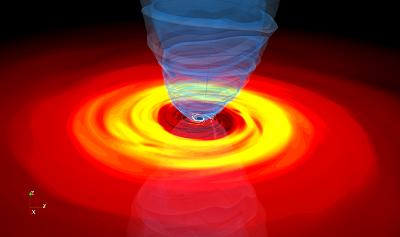 |
|
Astrophysical and Planetary Sciences Colloquium
Monday, April 04, 2022 at 3:35 JILA Auditorium and https://cuboulder.zoom.us/j/96468671083 Nicolas Scepi , JILA "Formation, Evolution and Radiation of Magnetized Accretion Disks"  Abstract:The impact of magnetic fields on the evolution and on the observational signatures of accretion disks is very uncertain. This uncertainty is mainly due to a lack of observational constraints on the magnetic field geometry or strength in accretion disks. However, even from a theoretical point of view our understanding of magnetized disks remains relatively poor. Indeed, analytic models of magnetized disks often need inputs from numerical simulations and numerical simulations of magnetized disks are difficult to perform and/or interpret. Because of this lack of magnetized disk models, standard disk models often reduce the magnetic field to a source of turbulence; turbulence through which the accretion can happen. While this simplification may hold for weakly magnetized disks, a large number of numerical simulations have shown that the role of a strong magnetic field goes far beyond producing turbulence. In particular, a strong magnetic field can produce powerful outflows, induce accretion through vertically elevated layers or non-axisymmetric structures, modify the time scales of accretion, enhance dissipation of gravitational energy in the disk and accelerate particles to very high energies. All of these effects dramatically affect the evolution and observational signature of accretion disks and open up new and exciting avenues to resolve outstanding problems of the standard accretion disk theory. In this talk, I will present an overview of my recent results on how strongly magnetized disks form, evolve and radiate. I will show in particular how strongly magnetized disks could explain events of very strong variability in AGNs, the flaring behavior of the Galactic center and the hardest emission in X-ray binaries.
|